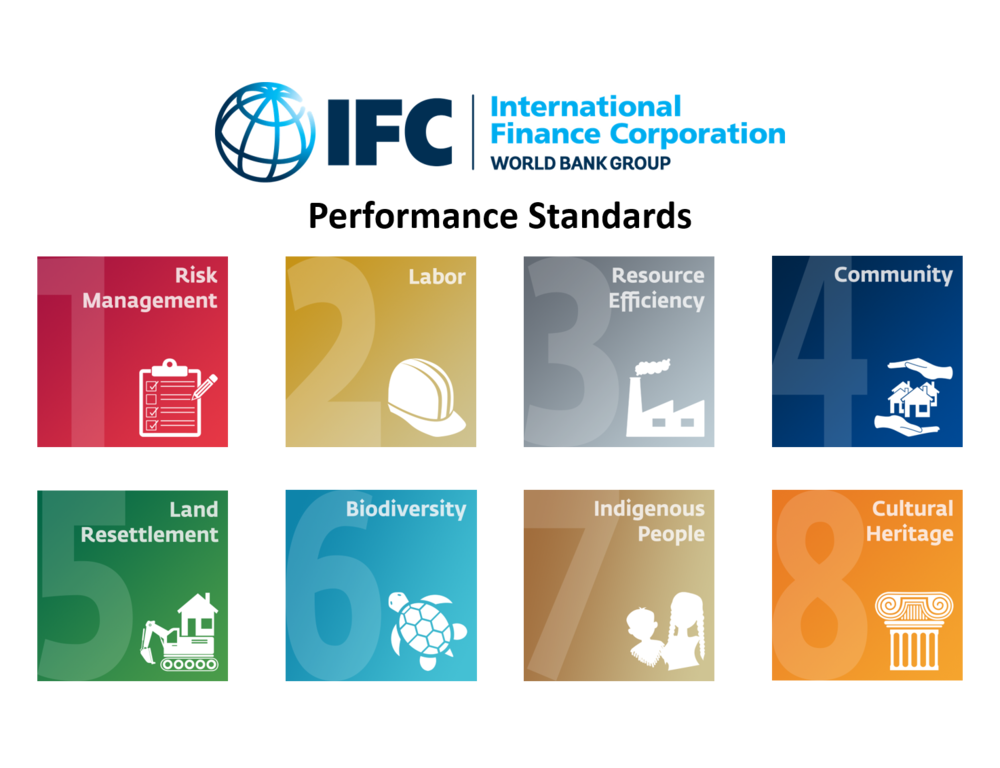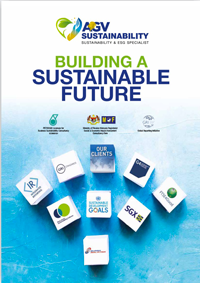SERVICES
IFC-PERFORMANCE STANDARDSIFC’s Performance Standards on Environmental and Social Sustainability have become globally recognized good practice in dealing with environmental and social risk management. In the financial markets worldwide, the Performance Standards have been catalyzing the swift convergence of standards for cross-border project finance.
- More than 90 banks and financial institutions have voluntarily adopted the Equator Principles, which are based on IFC’s Performance Standards.
- 32 export credit agencies of the OECD countries benchmark private sector projects against IFC’s Performance Standards.
- The Multilateral Investment Guarantee Agency (MIGA) applies IFC’s Performance Standards in its operations.
- The World Bank applies IFC’s Performance Standards (known as World Bank Performance Standards) to projects supported by IBRD/IDA (International Bank for Reconstruction and Development/International Development Association) that are owned, constructed and/or operated by the private sector.
IFC Performance Standards was updated in January 2012. Known as “2012 IFC-Performance Standards”, it requires
all project financing from Equator Principle financial institutions to develop a complete Environmental and Social Management Systems, ESMS. Key areas covered by 2012 IFC Performance Standards are:
- Broader Range Stakeholder Engagement
- Increased project development obligations
- Improved Prevention measures and Resources Management
- Preservation of Cultural Heritage
AGV’s experienced team of environmental and social impact assessment specialists have assisted a number of projects for Equator Principle financing and investments across the Asia Pacific region.

IFC PERFORMANCE STANDARDS
Performance Standard 1: ASSESSMENT AND MANAGEMENT OF ENVIRONMENTAL AND SOCIAL RISKS AND IMPACTS Underscores the importance of
identifying E&S risks and impacts, and managing E&S performance throughout the life of a project.
Performance Standard 2: LABOR AND WORKING CONDITIONS Recognizes that the pursuit of economic growth through employment creation and income generation should be balanced with protection of basic rights for workers.
Performance Standard 3: RESOURCE EFFICIENCY AND POLLUTION PREVENTION Recognizes that increased industrial activity and urbanization often generate higher levels of air, water and land pollution, and that there are efficiency opportunities.
Performance Standard 4: COMMUNITY HEALTH, SAFETY AND SECURITY Recognizes that projects can bring benefits to communities, but can also increase potential exposure to risks and impacts from incidents, structural failures, and hazardous materials.
Performance Standard 5: LAND ACQUISITION AND INVOLUNTARY RESETTLEMENT Applies to physical or economic displacement resulting from land transactions such as expropriation or negotiated settlements.
Performance Standard 6: BIODIVERSITY CONSERVATION AND SUSTAINABLE MANAGEMENT OF LIVING NATURAL RESOURCES Promotes the
protection of biodiversity and the sustainable management and use of natural resources.
Performance Standard 7: INDIGENOUS PEOPLES Aims to ensure that the development process fosters full respect for Indigenous Peoples.
Performance Standard 8: CULTURAL HERITAGE Aims to protect cultural heritage from adverse impacts of project activities and support its preservation.
THE BENEFITS OF THE PERFORMANCE STANDARDS
GUARD AGAINST UNFORESEEN RISKS AND IMPACTS
Implementing the Performance Standards helps companies identify and guard against interruptions in project execution,
legal claims, brand protection, and accessing international markets.
IMPROVE FINANCIAL AND OPERATIONAL PERFORMANCE
IFC believes that meeting the Performance Standards helps clients improve their bottom line. Implementation
of the Standards can help optimize the management of inputs such as water and energy, and minimize emissions,
effluents, and waste, leading to a more efficient and cost effective operation.
SOCIAL LICENSE TO OPERATE
In addition, the Standards help clients find ways to maximize local development benefits and encourage the practice of good corporate citizenship. This often results in greater acceptance of the project by local communities and governments, allowing companies to acquire a social
license to operate. Enhanced brand value and reputation may also be attractive to new investors or financiers.
GAIN AN INTERNATIONAL STAMP OF APPROVAL
The “Equator Principles,” which have been adopted by more than 70 of the world’s leading investment banks in developed and developing countries, are based on IFC’s Performance Standards. These principles are estimated to cover nearly 90% of project financing in emerging markets.

